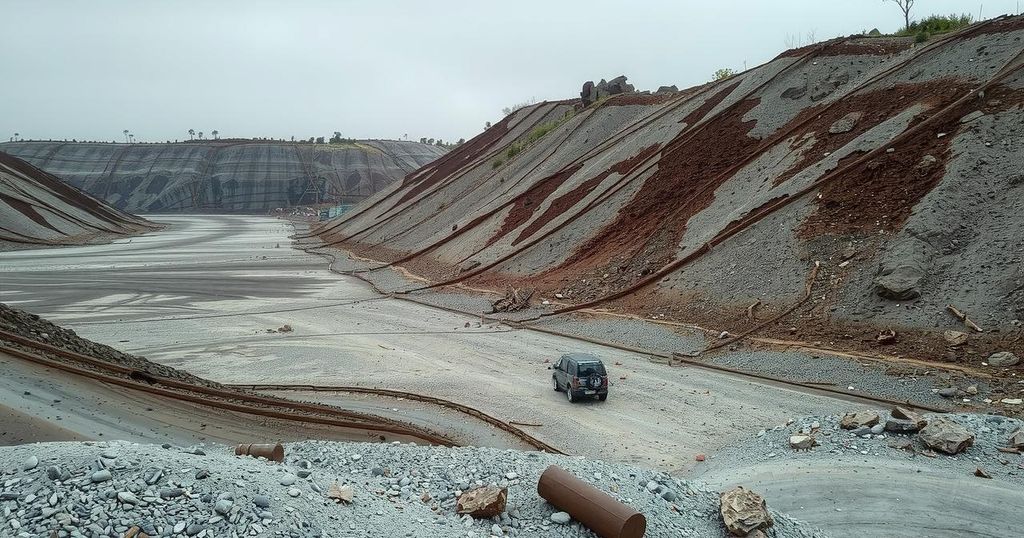Environmental Catastrophe: The Fallout of Mining Operations in Zambia

The Kafue River in Zambia was devastated by an acid leak from the Sino-Metals mine, prompting water supply disruptions for 700,000 residents. This incident is part of broader environmental concerns linked to Chinese mining practices across Africa, highlighted by ongoing violations and neglect of safety standards. The reliance on Chinese investments exacerbates the situation. Similar patterns are evident in Indonesia and the Democratic Republic of Congo, revealing a dire need for effective regulation and oversight.
The Kafue River in Zambia, previously a crucial lifeline, has been severely impacted by an acid leak from the Sino-Metals Leach Zambia mine. This incident occurred on February 18, resulting in the river becoming dangerously toxic almost instantaneously. Local resident Sean Cornelius stated, “Now everything is dead. Overnight, this river died,” illustrating the profound ecological damage witnessed firsthand.
In response to the spill, authorities suspended water supply services in Kitwe, affecting approximately 700,000 residents. The Zambian government took immediate action, deploying its air force to drop lime into the river in an effort to mitigate the acid. However, experts express concerns regarding potential long-term contamination of groundwater, as mining waste has shown persistence in impacting ecosystems.
Zhang Peiwen, chairman of Sino-Metals, issued an apology and pledged to restore the environment, although previous commitments have yielded minimal positive outcomes. Additionally, just days after the Kafue incident, another acid leak occurred at a separate Chinese-owned mine in Zambia’s Copperbelt, where operations continued despite government directives.
Concerns regarding the mining operations are not exclusive to Zambia. A study conducted by the Business & Human Rights Resource Centre from 2021 to 2022 identified over 100 incidents of environmental and human rights violations linked to Chinese mining across 18 nations. Reported violations include severe water pollution, ecosystem destruction, intimidation of environmental activists, and hazardous working conditions.
Zambia’s substantial debt to China, exceeding $4 billion, further complicates the situation. The government’s financial reliance on Chinese investments has created an environment in which regulations concerning safety and environmental protections are frequently ignored. In regions rich in copper, such exploitation has led to profound ecological and social repercussions.
Outside of Zambia, the ramifications of Chinese mining practices are apparent in Indonesia, which possesses the largest nickel reserves globally. There, residents experience severe environmental degradation, including deforestation and water contamination resulting from Chinese involvement. In the Democratic Republic of Congo, communities near the Ruashi cobalt mine endure the constant threat of detonations, leading to physical harm, including fatalities among residents.
Despite China’s professed commitment to “win-win cooperation” and “green development,” reality reveals ongoing environmental neglect. Many Chinese firms remain unresponsive to allegations of environmental infractions, with less than 20% addressing such claims compared to a global response rate of 56%.
The ramifications of these environmental violations are dire, depriving millions of access to clean water and essential resources for living. The escalating demand for critical minerals heightens the urgency of these issues as the quest for renewable energy inadvertently contributes to ongoing ecological disasters today. Zambian citizens now call for justice and stronger regulations to prevent further exploitation.
The Kafue River crisis underscores the need for stringent oversight of mining operations to prevent environmental destruction driven by foreign investments. The extensive ecological damage witnessed in Zambia, alongside similar patterns in other nations, reveals an urgent necessity for accountability and enforcement of environmental regulations. To protect communities and ecosystems from the adverse impacts of mining, it is critical that global standards are established and adhered to consistently.
Original Source: www.capitalfm.co.ke






